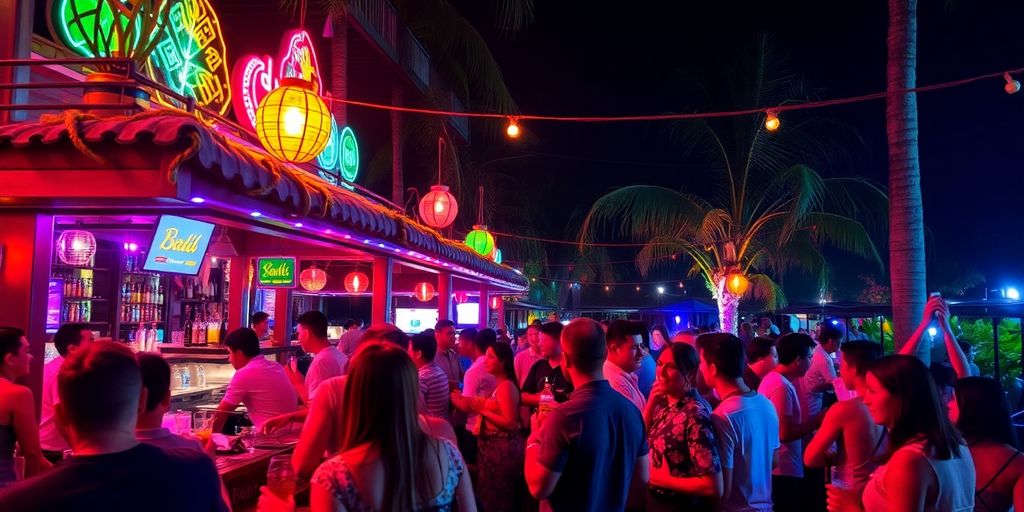Welcome to Canggu, where the beaches and nightlife create a lively atmosphere. While the excitement is palpable, it’s important to keep personal security in mind as you venture out after dark. This guide will help you navigate the nightlife scene safely, ensuring your adventures are not only memorable but also secure. Let’s explore the essential tips for enjoying Bali nightlife personal security without a hitch.
Key Takeaways
- Stick to well-lit areas and avoid isolated spots when walking at night.
- Always communicate your plans to someone you trust before heading out.
- Use licensed taxis or rideshare apps to get around safely after dark.
- Be mindful of local wildlife and street dogs that may pose a risk at night.
- Secure your belongings in your accommodation to prevent theft.
Nighttime Safety in Canggu
Canggu is awesome, right? Beach vibes during the day, party vibes at night. But let’s be real, things change when the sun goes down. It’s not all Bintang and good times; you gotta be smart. This isn’t meant to scare you, just a heads-up on how to keep your nights fun and safe.
Motorbike Mania
Okay, so motorbikes are everywhere in Canggu. During the day, it’s manageable, but at night? It’s a whole different ballgame. People are driving faster, maybe had a few too many drinks, and the roads aren’t always well-lit. Basically, you need to be extra careful when you’re walking around.
Here’s the deal:
- Stick to sidewalks when you can. Seriously, even if it’s a little out of your way.
- If you have to walk on the road, walk facing traffic so you can see what’s coming.
- Assume drivers don’t see you. Make eye contact if possible, but don’t count on it.
I remember one night, I was crossing the street and this motorbike came out of nowhere. I swear, they were going like 50 km/h. I had to jump back to avoid getting hit. It was a wake-up call. Now, I’m super cautious, especially after dark.
Street Dogs in the Dark
Okay, so the street dogs in Canggu are usually pretty chill during the day. They’re just lounging around, looking for scraps. But at night? Some of them get a little territorial, especially if they’re in a pack. It’s not like they’re rabid or anything, but they can be intimidating. If you are looking for dog-friendly places, make sure to check the reviews first.
What to do?
- Don’t make eye contact. It can be seen as a challenge.
- Don’t run. They’ll chase you.
- If they approach, try to appear confident and make a loud noise. A firm "No!" usually works.
- Carry a small stick or rock. Just having it can deter them. Don’t actually throw it unless you absolutely have to.
Emergency Prep Waltz
Hopefully, you won’t need this, but it’s always good to be prepared. Knowing what to do in an emergency can make a huge difference. Think of it as your "just in case" plan.
Here’s a quick rundown:
- Know the local emergency numbers. Write them down or save them in your phone. Don’t rely on Google if you’re in a panic.
- Have a basic first-aid kit with you. Band-aids, antiseptic wipes, pain relievers – the essentials.
- Tell someone where you’re going and when you expect to be back. That way, if something does happen, people will know to look for you.
- Learn a few basic Indonesian phrases. "Help," "police," and "hospital" are good ones to start with.
| Emergency | Number |
|---|---|
| Police | 110 |
| Ambulance | 118 |
| Fire | 113 |
Remember, a little preparation goes a long way. Stay safe out there and enjoy the Canggu nightlife!
Safety Tips for Solo Female Nighttime Adventurers
For solo female travelers, a night out in Bali can be amazing. It’s all about being smart and prepared. You want to relish the freedom of solo travel, but also make sure you’re safe and sound.
Researching Safe Routes
Before you head out, do a little homework. Check out the areas you plan to visit. Are they well-lit? Are there usually other people around? Knowing the safe areas can make a big difference. It’s also a good idea to look at maps and plan your route in advance. That way, you’re not wandering around looking lost, which can make you a target.
Communicating Your Plans
Always let someone know where you’re going and when you expect to be back. This could be a friend back home, someone you met at your accommodation, or even the hotel staff. Share your itinerary with them, including the names of the places you’re visiting and how you’re getting there. If your plans change, be sure to update them. It’s a simple step that can provide a lot of security.
Personal Safety Devices
Consider carrying a personal safety device. This could be a loud alarm, a whistle, or even pepper spray (though be sure to check the local laws regarding pepper spray). The point is to have something that can attract attention or deter an attacker if you find yourself in a dangerous situation. A simple whistle can be surprisingly effective in scaring someone off.
It’s also a good idea to keep your phone charged and have some local emergency numbers saved. That way, you can quickly call for help if you need it. Remember, being prepared is the best way to stay safe and enjoy your night out.
Comparative Safety Between Areas in Bali
Bali is generally a safe place, but it’s good to know that some areas have different vibes and potential risks than others. It’s not about scaring you, but more about being aware so you can have the best time possible.
Understanding Crime Rates
Okay, so Bali isn’t exactly Gotham City, but petty crime does happen, especially in tourist hotspots. Areas like Kuta, Seminyak, and Canggu tend to see more incidents of theft and scams simply because there are more tourists around. It’s a numbers game, really. Keep your belongings close, especially in crowded places. Don’t leave your phone on the table at a cafe, and be wary of overly friendly strangers. It’s all about using your common sense.
Safe Areas for Nightlife
If you’re looking for a safer nightlife experience, consider areas like Ubud or Sanur. These places tend to have a more relaxed atmosphere and lower crime rates compared to the party hubs. That’s not to say you can’t have fun in Kuta or Seminyak, just be extra cautious. If you’re after a quieter evening, these spots are great:
- Ubud: Known for its cultural experiences and tranquil setting.
- Sanur: A family-friendly area with a more laid-back vibe.
- Nusa Islands: Offer a secluded escape from the main tourist crowds.
Cultural Considerations
Bali is a deeply spiritual place, and respecting the local culture goes a long way in ensuring your safety and positive experience. Dress modestly when visiting temples, be mindful of noise levels, and avoid public displays of affection. Learning a few basic Indonesian phrases can also help you connect with locals and show that you respect their culture. Remember, you’re a guest in their home, so act accordingly. Also, be aware of the local customs around alcohol consumption. While drinking is common in tourist areas, getting excessively drunk can attract unwanted attention and make you a target for scams or theft. It’s all about balance and respect. If you want to know more about personal safety devices, there are many articles online.
Traffic and Transportation Safety

Getting around Bali, especially at night, can be a bit of an adventure. It’s not always the safest, so you need to be smart about how you move around. Think about it: narrow roads, lots of scooters, and sometimes not the best lighting. It’s a recipe for needing to be extra careful.
Choosing Licensed Taxis
When it comes to taxis, don’t just hop into any car that stops. Make sure you’re using a licensed taxi service. These are generally more reliable and safer. Apps like Grab or Gojek are super popular and easy to use. They let you see the driver’s info, track your ride, and pay through the app, which cuts down on potential scams. Plus, you know you’re getting a driver who’s registered and (hopefully) knows the roads.
Defensive Walking Techniques
Walking might seem like a chill way to get around, but you’ve gotta be on your toes. There aren’t always sidewalks, and traffic can be pretty wild. Here’s the deal:
- Always walk facing traffic so you can see what’s coming.
- Stick to well-lit areas, especially at night.
- Make eye contact with drivers before crossing the street – don’t assume they see you.
Seriously, be extra cautious. Drivers might not always follow the rules, and it’s better to be safe than sorry. Assume everyone is going to pull out in front of you, and you’ll be in a better spot.
Avoiding Isolated Roads
This one’s pretty straightforward. Sticking to main roads is a good idea, especially after dark. Isolated roads can be poorly lit and less traveled, which can make you an easier target for crime. Plus, if something does happen, it’s going to be harder to get help. If you’re on a scooter, plan your route ahead of time and follow local traffic rules.
Health and Environmental Hustles
Bali’s nightlife is amazing, but it’s important to think about your health and the environment too. It’s not just about having fun; it’s about staying safe and being a responsible traveler. Let’s be real, nobody wants to get sick or contribute to environmental problems while on vacation.
Vaccination Recommendations
Before you even pack your bags, check what vaccinations you might need. Talk to your doctor about recommended shots for Bali. Things like hepatitis A and typhoid are worth considering. Being proactive about vaccinations is a smart move. It’s way better than spending your trip feeling awful. Also, make sure your routine vaccinations are up to date. You don’t want to bring anything unexpected with you, or take anything back home.
Dealing with Local Wildlife
Bali has some cool wildlife, but it’s best to admire it from a distance. Street dogs are common, especially at night. While most are harmless, some can be aggressive. Avoid approaching or feeding them. Mosquitoes are another issue, as they can transmit diseases like dengue fever. Use mosquito repellent, especially in the evenings. Here’s a quick guide:
- Avoid direct contact with animals.
- Use insect repellent with DEET.
- Wear long sleeves and pants at night.
Remember, respecting wildlife is key to a safe and enjoyable trip. Don’t try to interact with animals, and always be aware of your surroundings. It’s their home, and we’re just visiting.
Natural Disaster Preparedness
Bali is in an area prone to natural disasters like earthquakes and volcanic eruptions. It’s a good idea to know what to do in case of an emergency. Check the location of emergency exits in your hotel, and be aware of any evacuation procedures. Download a reliable weather app to stay updated on potential threats. It’s also wise to have a plan for contacting family and friends in case of a disaster. Here’s a simple checklist:
- Know the emergency numbers.
- Identify evacuation routes.
- Keep a small emergency kit with essentials.
Securing Your Accommodation
Your hotel room or villa should be a safe space, but it’s smart to take some precautions. I’ve heard stories about break-ins, so it’s better to be safe than sorry. Think of it like fortifying your own little castle while you’re on vacation.
Locking Doors and Windows
This might seem obvious, but always double-check that all doors and windows are locked, even during the day. Balinese architecture can be beautiful, but sometimes the older buildings might have windows that don’t quite close properly. Make it a habit to check everything before you leave your accommodation and before you go to sleep. It only takes a few seconds, and it could save you a lot of trouble. If you’re staying somewhere with sliding doors, make sure they have a secure locking mechanism.
Using Safes for Valuables
Most hotels and villas provide a safe for guests to store their valuables. Use it! Don’t leave cash, passports, jewelry, or electronics lying around in plain sight. Even if you think your stuff is hidden, hotel staff and other visitors have access to your room. It’s just not worth the risk. Learn how to properly use the safe, and make sure it’s actually bolted to the wall or floor. Some safes are small and light enough to be carried away. If your accommodation doesn’t have a safe, consider keeping your most important items with you or asking the front desk to store them in their secure area. Remember to distribute your cash between the hotel safe, your wallet and a pocket.
Additional Security Measures
Beyond the basics, there are a few extra steps you can take to enhance your security.
- Consider bringing a portable door stop or alarm. These can be placed under the door to prevent it from being opened from the outside.
- If you’re staying in a villa, ask about the security system. Does it have alarms or security cameras? If not, you might want to request additional security measures, especially if you’re staying in a secluded area.
- Be mindful of who you let into your accommodation. Don’t open the door to strangers, and always verify the identity of anyone claiming to be hotel staff.
It’s easy to get relaxed on vacation, but it’s important to stay vigilant. A little extra effort can go a long way in protecting your belongings and ensuring a safe and enjoyable trip. Remember, being proactive about security is always a good idea.
General Safety Precautions for Bali Nightlife

Staying Aware of Your Surroundings
Okay, so you’re out in Bali, ready to have a good time. Awesome! But seriously, keep your eyes open. It’s super easy to get caught up in the fun, but being aware of what’s going on around you is the best way to avoid trouble. Watch out for drunk tourists on scooters, be mindful of your belongings, and trust your gut. If a situation feels off, it probably is.
Avoiding Excessive Alcohol Consumption
Look, nobody’s saying you can’t enjoy a few drinks. You’re on vacation! But getting completely wasted? Not a good idea. It impairs your judgment, makes you an easy target, and can lead to some seriously regrettable decisions. Plus, some local spirits, like Arak, can be dodgy and cause severe illness. Stick to what you know and pace yourself.
Traveling in Groups
There’s safety in numbers, right? Especially at night. Try to stick with your friends or travel buddies when you’re out and about. If you’re heading back to your accommodation, make sure you’re not alone, especially on those dark, quiet streets. If you do find yourself solo, call a reputable taxi or ride-sharing service. It’s always better to be safe than sorry. Also, make sure you have a natural disaster preparedness plan.
It’s easy to get distracted by the beauty of Bali, but remember that petty crime can happen. Keep your valuables secure, avoid flashing cash, and be cautious about sharing personal information with strangers. A little bit of vigilance goes a long way in ensuring a safe and enjoyable night out.
Final Thoughts on Staying Safe in Bali’s Nightlife
As you wrap up your Bali adventure, remember that enjoying the nightlife doesn’t have to come with worries. Just keep your eyes open and stay aware of your surroundings. Stick to well-lit areas, and don’t hesitate to use rideshare apps if you need a lift. It’s all about being smart and prepared. Trust your instincts, and if something feels off, it probably is. With a little caution and common sense, you can have a great time exploring Bali after dark. So go ahead, soak in the vibes, and make some unforgettable memories!
Frequently Asked Questions
Is it safe to go out at night in Canggu?
Yes, Canggu is generally safe at night, but it’s smart to stay alert and stick to well-lit areas.
What should I do if I encounter a street dog while walking at night?
If you see a street dog, try to stay calm and avoid sudden movements. Walk away slowly and don’t engage.
Are there any specific areas in Bali that are safer for nightlife?
Ubud and Sanur are known to be safer for nightlife compared to busier areas like Kuta and Seminyak.
How can I ensure safe transportation at night?
Always use licensed taxis or ride-hailing apps like Grab for safe transportation after dark.
What health precautions should I take while enjoying Bali’s nightlife?
Make sure you’re up to date on vaccinations and be cautious about drinking tap water.
What should I do to secure my accommodation while staying in Bali?
Lock all doors and windows, use a safe for your valuables, and consider additional security measures like alarms.







